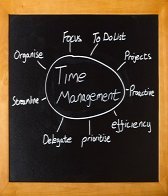|
Personality and Coping with StressEach of us is unique in coping with stress. We all know individuals who appear unruffled by stressful events and others who get into a tail-spin. The effects of stress very much depend on your personality type. People with an optimistic personality are more resilient towards the effects of stress compared to people who may be more pessimistic. Similarly, individuals with a Type A personality tend to be action-orientated, rush to complete things, and are overly ambitious. Type A people can be prone to stress-related illnesses compared to Type B personality types. People with Type B personality tend to be more relaxed and less time-driven in their pursuits. Here we discuss the role of personality in coping with stress. When a B is better than an ADid you know that a B is better than an A. This tends to be the case when it comes to personality and coping with stress. Type A behavior is characterized by trying to achieve more and more in less and less time. Type A personality types often feel pressured for time and are highly competitive. In the course of struggling against time and striving to compete, the fight or flight response can be triggered repeatedly. Type A's and Job Stress Type A behavior patterns increase the effect of stress at work. For example, in a machine-paced letter-sorting job compared to a self-paced worker, the former led to higher levels of anxiety, depression and anger, but only for Type A personality types (Hurrell, J., 1985). Increased stress at work and fatigue are some of the causes of job burnout. While the fight and flight response may have helped our ancestors escape from the jaws of a saber-tooth tiger to live another day, this stress response is not likely to be the optimal response in today's world. When confronted with some of today's causes of stress, whether it is dealing with your boss or a customer, concerns over finances, or relationship stress, usually a rational response is better fighting of fleeing from the cause of stress. Indeed, the close relationship between stress and health means that today's constant stress leads to fatigue and burnout.
Type A behavior is also linked to poorer health outcomes! The strongest evidence for a link between Type A behavior and coronary heart disease is work that was conducted by Meyer and Friedman in the 1950s. They found that the risk factors associated with coronary heart disease, namely hypertension, smoking and high serum cholesterol did not explain the increased incidence of heart disease. In this study they identified that Type A behavior increased the risk of heart disease. Are you a Type A or Type B?There are a number of ways to test if you have a Type A or a Type B behavior pattern:
However, by taking a good look at yourself or asking yourself what category your friends, partner, or children would put you in can be a good indicator.
Breathing Exercises as a Stress Reduction Technique One of the simplest and most effective ways to reduce stress is right under your nose.
These breathing exercises use diaphragmatic breathing as a stress reduction technique.
Typical characteristics of a Type A behavior pattern are:
In terms of other measures of personality, Type A behavior could possibly align itself with the neuroticism factor in the Big Five, or the left-side STJ in the Jungian Type Inventory. On the other hand, Type B people are not preoccupied with achievements and are more interested with relaxing and having fun. They may be more aligned with the right-side of the STJ Jungian Type Inventory. Here is more information on how knowledge of your Myers Briggs personality type can help you manage your stress. Coping with stress for Type A people is about becoming a Type B without losing the things you want! Type A people tend to have desires that can be quantified, such as a better-paid job, more productivity, or getting things done. However, these accumulated outward successes may hide an inner emptiness! Are you living your life the way that you want to, with balance and respect towards yourself and others?
Rather than running your life as a series of 100m dashes, plan and pace yourself as a marathon runner. One way to question yourself is to imagine your retirement dinner in 5, 10 or 20 years time, in which your colleagues, friends and family all have a couple of minutes to talk about you to the others. Set aside time and visualize what you would like each group to say about you. Visualize your own desires and goals, and where you would like to be in 5, 10 or 20 year’s time. Examine your goals. Are your goals balanced? Are they within your reach? Are you devoting enough time to achieving your goals? How are you spending your time now? Use these personal goal setting strategies to help you do this.
Type A personality types consistently feel time-pressured in their activities. One of the best ways of coping with stress due to time urgency is to manage your time. This online time management course and time management tips enable you to work more efficiently and effectively.
Rather than run your race as a series of 100m dashes, slow down and plan for the long race. Type A people like to do several things at once and rush from on thing to another. While you may think this is an efficient way to do things, evidence suggests that increased errors and poorer quality of work is often the result. What Stress Management Techniques Do You Use? Tell us what stress management techniques work for you. Fill out this stress management survey. Developing a time management system that works for you and lets you enjoy more relaxation time. Whatever system you use ensure that you create a time management schedule that leaves you enough time between tasks, and then add some more. By leaving yourself extra time, you are able to relax and enjoy your work more. Try to set boundaries on your work. Remember that time will not make the choice for you - you are the one that decides when your work is done. Here are some tips to achieve work life balance. Do you view a cup as half-full or half-empty?Research shows that an optimist is more stress resilient. Optimists are less likely to report an illness in stressful periods and are more likely to recover more quickly after surgery (Scheier & Carver, 1985, 1993). Why? Primarily there are two reasons for this:
So are you an optimist or not? The answer to this question is important in coping with stress. Related stress management articles
Stress Causes: Some Common Stress Causes Definition of Stress: A Contemporary Stress Definition Stress Relief: How to Relieve Stress
|



